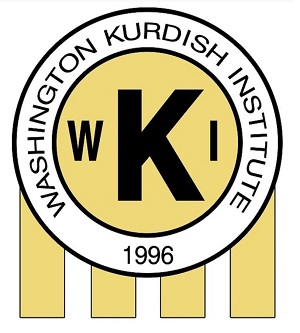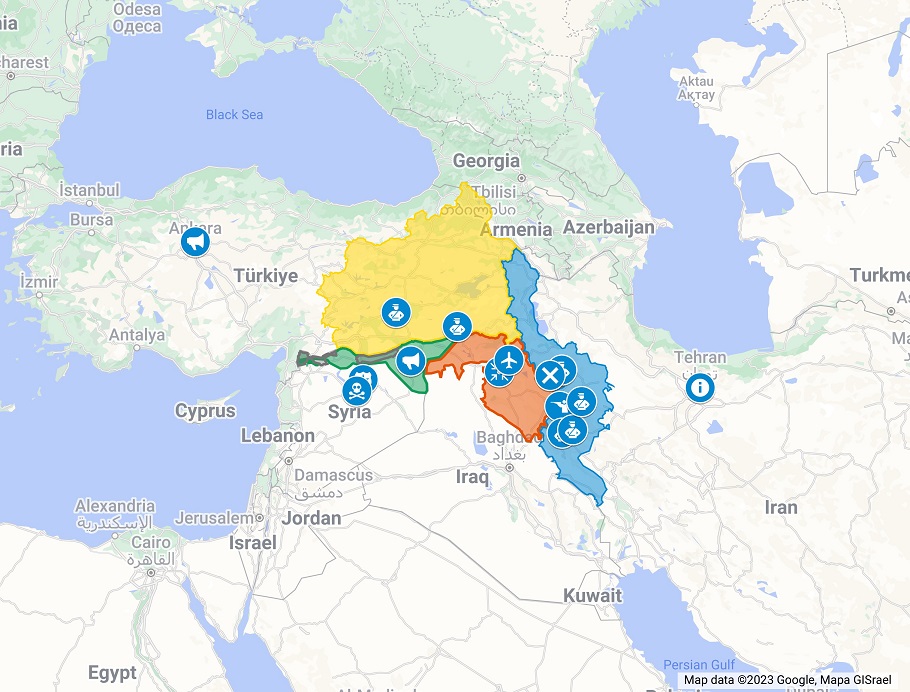826
A weekly brief of events occurred in the Kurdistan regions of Iran, Iraq, Syria, and Turkey.
Iran
- The Hengaw Organization for Human Rights reported that the Islamic Revolutionary Guard Corps (IRGC) and the Kurdistan Free Life Party (PJAK) engaged in heavy fighting near Baneh on Thursday. Hengaw claimed the fighting was sparked by the IRGC’s deployment of additional forces near Nezhow village. The IRGC and other regime forces have been reinforcing their presence in Iranian Kurdistan since 2018. Concurrently, Iranian authorities arrested more Kurds to stifle anti-government unrest and repress Kurdish political activity. Among the detainees were two siblings in Senna, four Yarsani activists in Dalahu, a Kurdish man in Naqadeh, and two youths in Kermanshah. The fate of several previously detained Kurds remains unknown, including that of a female journalist named Bakhshan Azizi. Moreover, Saqqez’s Islamic Revolutionary Court sentenced a labor activist named Osman Ismaeli to 18 months in prison for “propaganda against the state” and “membership in a Kurdish party.” At the same time, Iranian border guards killed one Kurdish border porter (kolbar) and wounded a dozen in Nowsud and Baneh.
Iraq
- Iranian-backed militias targeted U.S. personnel stationed at al Harir Air Base in Erbil Governorate with two suicide drones on November 8. Both of the drones were shot down before they could reach their targets. Wednesday’s attack marks the 34th time Iran and its proxies have attacked Iraqi Kurdistan since 2018. Iranian-backed militias also attacked al Assad Air Base in Iraq’s Anbar Province several times Wednesday night.
- Iraqi Prime Minister Mohammed Shia al Sudani met with several top Kurdish officials in Erbil. Sudani’s visit came as Baghdad continues to deny the Kurdistan Regional Government (KRG) its share of the federal budget and money for public employee salaries in Iraqi Kurdistan. The KRG called for al Sudani to “promptly disburse the salaries and financial entitlements of the Kurdistan Region.” A statement from the Presidency of the Kurdistan Region said President Nechirvan Barzani discussed Iraq’s economic, political, and security situation with al Sudani. Al Sudani concluded his trip to Erbil by meeting with Kurdistan Democratic Party (KDP) leader Masoud Barzani and discussing relations between Baghdad and Erbil. Iraqi Minister of Oil Hayyan Abdul Ghani then met with Kurdish officials in Erbil and addressed the resumption of Iraqi Kurdistan’s oil exports. Reuters claimed the exports were scheduled to resume within three days. Concomitantly, Iraqi officials met with representatives from the Association of the Petroleum Industry of Kurdistan (APIKUR) in Dubai. The APIKUR emphasized the urgency of resuming full oil production and exports in Iraqi Kurdistan and suggested Iraq’s State Organization for Marketing of Oil (SOMO) negotiate oil contracts with APIKUR members.
Syria
- The Syrian Observatory for Human Rights (SOHR) reported Islamic State (Da’esh) attacks killed at least 34 Assad regime soldiers and pro-Assad militiamen in the Rusafa desert. Russian warplanes launched retaliatory strikes that allegedly killed over 30 Da’esh fighters. Since its territorial defeat, Da’esh has waged an insurgency in central and northeastern Syria and has perpetrated numerous attacks against the Syrian Democratic Forces (SDF) and the Assad regime. One such attack killed 10 Assad regime soldiers in Raqqa in August, and another killed 33 in Deir ez Zor several days later.
- The SDF announced its Anti-Terror Units (YAT) arrested a senior Da’esh commander named Muhammad Sakhr al-Bakr, aka Khaled al Shami, in Raqqa. Al Shami served as Da’esh’s deputy military commander for the Wilayat al Sham, which refers to all of the organization’s claimed territory in Syria. The SDF claimed al Shami participated in the planning and organization of the al Sina’a prison raid in al Hasakah in January 2022. Al Shami also played a major role in planning and facilitating terrorist attacks and military operations aimed at overthrowing the Autonomous Administration of North and East Syria (AANES) and restoring Da’esh’s territorial control of the region.
- U.S. Secretary of Defense Lloyd Austin announced U.S. airstrikes targeted the IRGC in Deir ez Zor and Iranian-backed groups in Iraq and Syria in response to Iran’s recent attacks on U.S. personnel. Austin also warned the U.S. would not hesitate to strike additional Iranian targets if Iran and its proxies did not cease their attacks on American personnel in the region. The SOHR said the strikes killed at least eight pro-Iran fighters and posited the death toll is expected to rise. The strikes destroyed a munitions warehouse and a missile launcher.
Turkey
- The governor of the predominantly Kurdish Şırnak Province’s Cizre District banned a Kurdish concert scheduled as part of the Cizre Culture and Art Festival. Several local and national civil society groups, including the Confederation of Public Employees’ Trade Unions (KESK) and the Sanatça art group, conducted a sit-in and released public statements expressing their outrage. KESK member Murat Özbey summarized the protesters’ sentiments by stating, “Kurds once again face prohibitive practices against Kurdish culture and language. The ban on language, culture, and traditional attire persists, contributing to denial. For centuries, the Kurdish people have been systematically subjected to both assimilation and attempted eradication.” The ban is the latest in a long line of attempts to restrict Turkey’s Kurdish population’s freedom of cultural expression that goes back to the founding of the Turkish Republic in 1923.
- The Democratic Regions Party (DBP) held its sixth Extraordinary Congress at the Ankara World Trade Center and elected Çiğdem Kılıçgün Uçar and Keskin Bayındır as its new co-chairs. The co-chairs’ speeches centered on the notion that Turkey’s Kurdish issue and the efforts of the DBP are an ongoing struggle against fascism and that Abdullah Öcalan’s prison conditions must be significantly improved if he is not granted freedom. Both speeches emphasized freeing Öcalan is necessary and intrinsically linked to the Kurdish struggle and that Kurdish liberation in Turkey cannot be obtained without Öcalan’s freedom. Uçar also invited all of the attendees to demand the end of Öcalan’s incarceration at the Gemlik March on November 18.
- A Turkish court handed former DBP co-chair Emine Ayna a suspended two-and-a-half-year prison sentence on charges of disseminating propaganda for the banned Kurdistan Workers’ Party (PKK). Ayna, who remains jailed because of her involvement with the Kobani case, achieved renown for bringing attention to Turkey’s Kurdish issue and advocating a political solution to the ongoing oppression of Kurds in Turkey. In addition, Ayna campaigned for better prison conditions for Abdullah Öcalan and asserted he must play a key role in the solution to Turkey’s Kurdish question. Ayna’s attorney has argued that her speeches fell within the scope of legitimate political activity because she was a member of parliament at the time. Ayna’s attorney also contended that none of her speeches contained any threats or incitement to violence.

